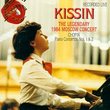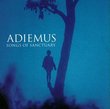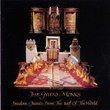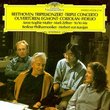| All Artists: Franz [Vienna] Schubert, John Eliot Gardiner, Vienna Philharmonic Orchestra Title: Schubert: Symphony No. 9; Gesang der Geister über den Wassern Members Wishing: 0 Total Copies: 0 Label: Deutsche Grammophon Release Date: 11/10/1998 Genres: Pop, Classical Styles: Vocal Pop, Opera & Classical Vocal, Symphonies Number of Discs: 1 SwapaCD Credits: 1 UPC: 028945764825 |
Search - Franz [Vienna] Schubert, John Eliot Gardiner, Vienna Philharmonic Orchestra :: Schubert: Symphony No. 9; Gesang der Geister über den Wassern
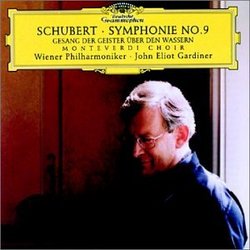 | Franz [Vienna] Schubert, John Eliot Gardiner, Vienna Philharmonic Orchestra Schubert: Symphony No. 9; Gesang der Geister über den Wassern Genres: Pop, Classical
|
Larger Image |
CD DetailsSimilarly Requested CDs
|
CD ReviewsGardiner Records Fantastic Version of Schubert 9! Darin Tysdal | Bloomington, MN 55420 | 01/11/2000 (5 out of 5 stars) "This performance is a hybrid. There is of course, Gardiner's experience with period performance which you can hear in the interpretation of this marvellous symphony. However, this performance uses modern day instruments, and does not include the massive repeats in the 3rd and 4th movements. So this is a combination of two styles of performance. So the movements go skipping along without losing their gravity-and we do not get bored! I have always enjoyed recordings by Norrington (with all repeats included) Bruno Walter (very staid, validictorian, almost, but with glowing orchestral playing! ) and Toscanini (who of course, is fiery if with coarse recording quality) and I also enjoyed Gardiner's very well. Apparently there exists an older recording by Gardiner of this symphony on Erato also which I have not heard. Recommended!" A brittle, unsmiling performance--what period is this suppos Santa Fe Listener | Santa Fe, NM USA | 04/16/2006 (2 out of 5 stars) "I'm willing to take my knocks as an avowed critic of Gardiner's amateurish conducting, which runs every piece through the same mill. Last week I heard him conduct the Schubert Ninth with the London Sym. in Barbican Hall, a performance so stilted and wooden that the only entertainment value was watching Gardiner's conducting style, which resembles a drowning man flailing for help. This DG recording from 1998 is a few notches better. The strings exhibit a modicum of expressive vibrato, as you'd expect from Vienna--who slipped up? The tempos are quick and steady, which may be "period style" but is out of touch with the spirit of Schubert's supple melodies and the need for variety in any music this repetitive. The slow opening to the first movement is taken in cut time, a dubious recent fad that robs the main Allegro of contrast. Almost all the phrasing throughout is clipped and terse rather than tender. The Vienna Phil. follows the conductor's directions as to specifics, but their overall style remains, as always, the same warm, yielding one we expect, thank goodness. Enough. Carping about Gardiner earns one a volley of poison darts, but his Schubert cost me a disagreeable hour in the concert hall, and this is the only way I can exact revenge." Cut time is correct D. Lopata | USA | 10/19/2006 (3 out of 5 stars) "The previous reviewer states: "The slow opening to the first movement is taken in cut time, a dubious touch that robs the main Allegro of contrast."
Actually, that was Schubert's intent. Quoting from a recent program of the Los Angeles Philharmonic: "By the early years of this century, [Schubert's 9th] had settled comfortably into the repertory. What settled in, however, was hardly an accurate reflection of Schubert's intent. Until recently, the published editions have contained countless errors when compared to the original manuscript, which resides in the library of the Gesellschaft der Musikfreunde in Vienna. The simple correction of the score's opening marking, from the published versions' four beats in a bar to the manuscript's two (alla breve) - one of numerous errors rectified - greatly changes the character of the first movement, and by extension the entire Symphony, from Bruckner-like massiveness to something more nervy, lithe and springy, more athletic - more Schubertian, if you will." All in all, I'm not overly enthusiastic about this recording, nor about the 9th in general, but this recording got the opening right with Schubert's cut time intent." |

 Track Listings (5) - Disc #1
Track Listings (5) - Disc #1